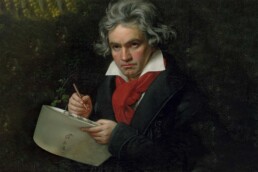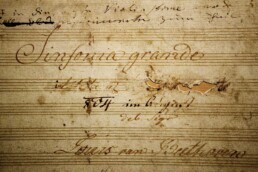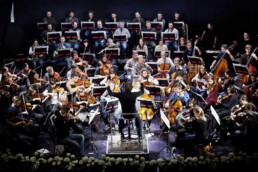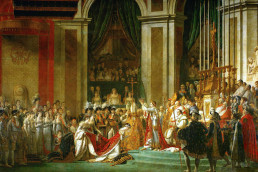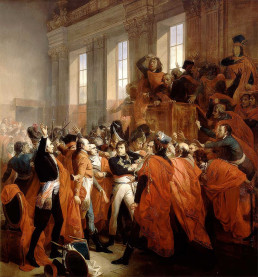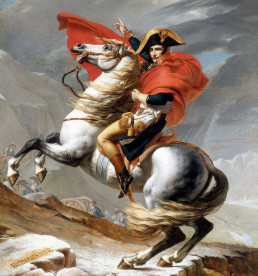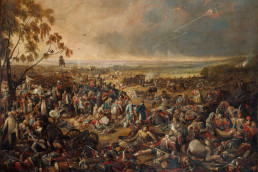Beethoven's Symphony of Joy
The beautiful hills of Bonn, Germany, witnessed the development of one of history’s most transformative composers in 1770. A child prodigy, born to a court musician father, began his path in a chaotic environment, rather than with privilege. From a young age, this youngster was motivated by music, sculpted by hard discipline and a desire to transcend the ordinary.
The latter half of the eighteenth century was a period of colossal upheaval. Enlightenment ideals collided with existing regimes, resulting in uprisings across Europe. Against this setting, a young composer immersed himself in the Classical traditions established by Haydn and Mozart. Nonetheless, even in his early years, whispers of an unbreakable spirit and revolutionary flair distinguished him. This was no ordinary imitator; this was an artist destined to push the frontiers of music itself.
In an era ripe for revolution, grand symphonies, intimate sonatas, and ground-breaking concertos emerged. His Third Symphony, *Eroica*, originally dedicated to Napoleon Bonaparte, defied expectations with its audacious length and emotional depth. The Fifth Symphony, with its signature “fate knocking at the door” motif, is still one of the most recognised works in Western music. Piano sonatas such as the *Moonlight Sonata* and *Pathétique* demonstrate the depth of his contemplative brilliance.
Perhaps his best effort, the Ninth Symphony, concludes with the *Ode to Joy*, a choral climax that depicts global brotherhood—a feeling that continues to reverberate today. Such masterpieces were more than just compositions; they were expressions of human perseverance and transcendence.
Few incidents in the history of art are more heartbreaking and uplifting than the loss of a master composer’s hearing. Deafness began as a minor condition in his late twenties and gradually worsened, sinking him into despair. The renowned *Heiligenstadt Testament*, a letter he penned but never mailed, depicts his internal struggle: on the verge of death, he decided to live for his work. Against all odds, his disability fuelled his creativity rather than hindering it. During this period of intense quiet, Beethoven composed some of his most famous compositions, including the Ninth Symphony.
While widely honoured, his life was not without controversy. His volatile disposition, described by contemporaries as unpleasant and erratic, alienated many of those around him. Legal fights over custody of his nephew Karl revealed a very flawed but human side, characterised by possessiveness and domineering tendencies. Even romantic endeavours were plagued with heartbreak. The mystery of the “Immortal Beloved,” an unidentified character referenced in a passionate letter, continues to fascinate academics and fans.
Critics of his period were frequently divided, with some praising his creativity and others dismissing his drastic departures from norm. However, history has been clear in its assessment. His works provided the groundwork for the Romantic era, influencing figures such as Brahms, Wagner, and others.
The premiere of the Ninth Symphony in 1824 was one of the most melancholy occasions of his life. Unable to hear the thunderous clapping, he reportedly turned around to see the audience’s overwhelming adulation. This one event represents not just creative accomplishment, but also human tenacity in the face of enormous circumstances.Another defining event was his funeral in 1827. Over 20,000 people packed the streets of Vienna to say goodbye, demonstrating his great influence on his contemporaries and the musical world.
His works continue to have a profound impact across genres, civilisations, and centuries. His compositions have appeared in a variety of settings, including grand orchestral concerts, film scores, advertisements, and pop music. The *Ode to Joy* serves as the European Union’s anthem, representing ideals of unity and peace.
Modern interpretations of his life and work continue to flourish, ranging from biographies and films to academic research that reveals new insights into his creative processes. For many, his life story exemplifies the limitless potential of human ingenuity, especially in the face of tragedy.
The capacity to connect across time is what distinguishes a genius, and this composer’s music does just that. His compositions encourage listeners to go into the depths of emotion, the heights of human aspiration, and the beauty of artistic inventiveness. In an ever-changing world, his music serves as a constant, a bridge to the sublime that reminds us of our common humanity.
In the Shadow of Waterloo: Napoleon's Triumphs and Tragedies
The name Napoleon Bonaparte is whispered on the wind in France, a country steeped in romance and revolution. His impact may be felt everywhere, from the sun-kissed vineyards of Italy to the winding alleyways of Paris. But what happened under the rule of a young military commander, and how did he come to power?
In the year 1769, our adventure starts in Ajaccio, Corsica. The fact that Napoleon’s childhood home is still standing today is evidence of his modest origins; he was born into a minor nobility family. His Corsican ancestry caused him to be first rejected from the esteemed École Militaire in Paris. Still, his intelligence and commitment were obvious. After completing his studies in mathematics, artillery tactics, and military history, he was promoted to the rank of second lieutenant in the French army.
Napoleon was forged in the fires of the French Revolution, which started in 1789 and lasted for a time of tremendous social and political turmoil. His strategic genius shone through in triumphs over Royalist forces, propelling the young lieutenant through the ranks in no time. His stellar reputation as a military genius was solidified during the Italian Campaign (1796–1797). His heroic actions at Arcole and Lodi, where he infamously took a standard and charged forward to rally his troops in the face of heavy fire, became legendary victories. His comrades revered him for his strategic insight and courage in sharing the risks of battle, and they spoke of him with awe as they whispered his name.
Napoleon had become a national hero by 1799. France was in a state of political chaos when he returned from an effective campaign in Egypt. He took advantage of this uncertainty by staging a coup d’état, which led to the bloodless toppling of the corrupt Directory. He provided the country with much-needed stability in his role as First Consul. Among his changes, the Napoleonic Code stands as the cornerstone of modern French civil law. Streamlining legal matters, the code established a meritocratic system, and promoted citizen equality.
With the majesty of Notre Dame Cathedral as his backdrop, Napoleon proclaimed himself emperor in 1804. War had worn France down to the point that she longed for grandeur and tranquilly. Napoleon, who was always one for a grand spectacle, planned a symbolic crowning ceremony. He sewed a laurel wreath around his head, just like ancient Roman emperors did, to cement his position as ruler and his desire to establish a new empire.
he map of Europe was changed by a succession of wars fought during Napoleon’s rule. A highly mobile and thoroughly trained military army, his Grande Armée, marched across the continent, from the cold Alps to the hot sands of Egypt. Triumphal arches, monuments that are still standing in Paris today, were built to commemorate victories and national mourning to mark defeats. But everything changed in the end. A catastrophic turning point was the brutal Russian winter of 1812. The once-invincible army of Napoleon was ravaged, and his hold on power started to weaken.
Napoleon was sent to the distant island of Elba after being compelled to abdicate in 1814. In 1815, at the Battle of Waterloo, a daring escape and a last attempt at power were both crushed. Saint Helena was Napoleon’s secluded retreat during his last years; he passed away there in 1821.
Like the man himself, Napoleon’s legacy is complicated. Although he was a master military strategist, his brutal reign and the catastrophic Napoleonic Wars are what most remember him for. Still, France was brought into the modern era by his reforms, and his impact on European law and culture is seen even today. At the western end of the Champs-Élysées, the Arc de Triomphe remains a daily reminder of Napoleon’s ambition and effect; he commissioned it to honour his troops and himself.
Explore the Czech Republic’s Austerlitz battlefield, where a smaller French army defeated a larger Austro-Russian one thanks to Napoleon’s brilliant use of artillery. Learn about pre- and post-Napoleonic France at the opulent Palace of Versailles. The luxurious apartments of Napoleon at the palace provide a window into his life as an imperial. Stand beneath the golden dome of Les Invalides in Paris, a complex that today houses Napoleon’s ultimate burial place and served as a hospital for warriors during his rule.
It is possible to go through a watershed period in European history by following Napoleon’s path. It’s a sobering reminder that power is transitory but desire and reform are everlasting legacies. You are about to go on a journey through time, following in the footsteps of Napoleon Bonaparte, so fasten your walking boots.
